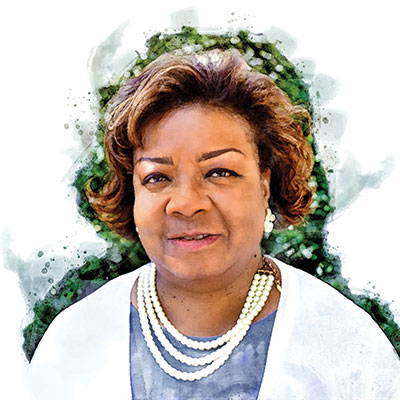Planning October 2020
Perspectives
Honoring Our History, Planning Our Future
From the Chair, Planning and The Black Community Division
By Victoria Mason-Ailey
This year, 2020, marks 40 years since the founding of the Planning and the Black Community Division, when, in response to the racist environment in professional planning, Rodney G. Proctor and William M. Harris Sr., PhD, FAICP, moved to create an advocacy division within the American Planning Association. Professional self-determination and encouragement for African American planners were central to their efforts. The wisdom of their foresight is readily apparent today.

Victoria Mason-Ailey, AICP, is the chair of the Planning and the Black Community Division. Mason-Ailey is a graduate of Brown University and Columbia University's Graduate School of Architecture, Planning and Preservation (GSAPP), where she received a master's in urban planning with a specialty in transportation. Her career spans 30 years with much of her work focused on comprehensive planning, community engagement, and community affairs in both New York City and Philadelphia.
Since its founding, PBCD's mission has been to provide a national forum for planners, administrators, public officials, students, and other interested individuals to address issues of significance to the Black community, promote exchange between members and other organizations, encourage and support professional development among Black planners, and provide career information.
We have achieved a great deal over the last four decades, from honoring the influence of PBCD members and planners like Harold Foster with a special equity-focused issue of the PBCD newsletter to providing student grantees with a three-month research project as part of the annual Robert A. Catlin/David W. Long Memorial Fellowship. We have also offered the broader planning community invaluable research, technical assistance, and educational opportunities on topics like equitable development, strategies for recovery and resilience from hurricanes Katrina and Dorian, climate change, the "prison industrial complex," and environmental justice. Thirteen percent of current PBCD members are AICP and FAICP, and several PBCD members have served in APA leadership, including AICP president-elect Mitchell Silver, FAICP, who was also APA's president from 2011–2013.
But it's been a long road, and these accomplishments have not come without challenges. Even the formation of the division did not come easily. In 1980, at the National Planning Conference in Cincinnati, when Proctor and Harris made the case to the APA board to embrace forming this new division, they met opposition. Some within APA did not want the division to form. Others argued APA's division structure was for "planning disciplines" and not "affinity groups." Some even called the idea racist because the focus would be on one race of people.
Proctor and Harris countered that the division would be open to anyone who was concerned about planning issues in our community, and not just Black planners. Our founding members also endorsed the idea of other minorities having divisions dedicated to their relevant issues. They recognized the need for planners of color to be participants in decision making and serve as leaders within APA. Ultimately persuasive in their arguments to the APA board, the PBCD was formed, with Proctor serving as the division's first chair and Harris as its newsletter editor.
"It is essential that we work to increase the presence of Black planners within the profession, within APA, and among its leadership. Our skills, knowledge, and awareness will enhance the conversations and collaborations that will be needed."
—Victoria Mason-Ailey, AICP
Today, PBCD is one of APA's 22 divisions, with a membership that exceeds 1,100 planners. Two-thirds of our membership are students — future planners who can help shape the future of the profession and planning.
The disparities within our community today are severe. Racism and systemic injustice continue to threaten the fabric of our neighborhoods in a myriad of ways:
- Housing of insufficient quality and affordability
- Inequities that limit opportunities for employment and economic development
- Neighborhoods situated near facilities that generate hazardous wastes in the ground and in the air
- A lack of fresh food and nutritional options that often result in food deserts
- Public transit options and access that don't meet community needs
- Disproportionate policing and profiling of black Americans
- Limited access to wifi and technologies that increase the digital divide
Add to this list the COVID-19 pandemic. This crisis continues to illustrate the extent of the racial disparities listed above, along with inequities in health care, education, and employment.
PBCD must continue to examine, draw attention to, and address these issues. We have an obligation to facilitate conversation and formulate strategies to bring about change in collaboration with others, domestically and abroad. We must be advocates for our underserved communities and develop policies that lead toward healthier ones.
Looking forward, it is essential that we work to increase the presence of Black planners within the planning profession, within APA and among its leadership. Our skills, knowledge, and awareness will enhance the conversations and collaborations that will be needed. Our experience will serve to strengthen the strategies and policies put forth as we work to address the effects of racial discrimination and segregation. We are equipped to be effective advocates and active listeners for our vastly underserved communities and to benefit the greater good.
The PBCD 40th Anniversary virtual conference planned for November 6–7, 2020, will focus on many of these and other issues facing our community. It will provide an opportunity to reinforce PBCD's commitment to equip all planners with the skills and awareness needed to work for the greater good. We invite planners of all colors and backgrounds to join us, listen, learn, and make a difference in the communities we serve.
Learn more about PBCD and its 40th anniversary conference.


